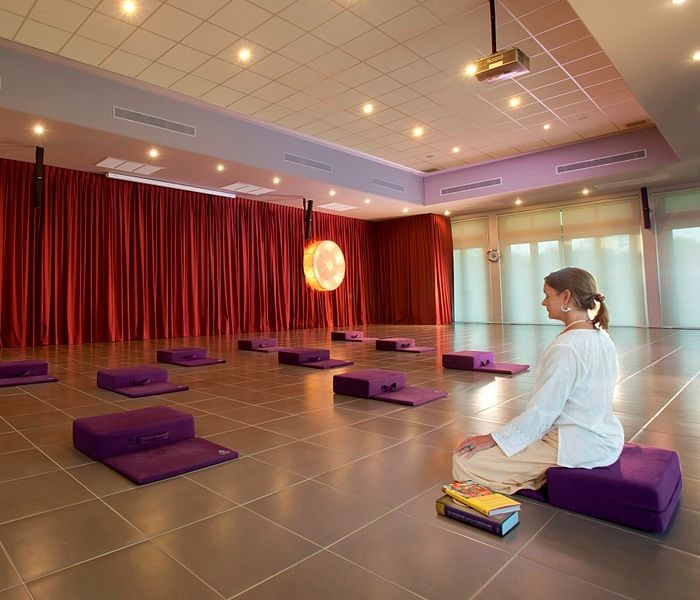Advice for Aspiring Meditation Teachers
Once a month someone writes me and asks for my advice on how to become a meditation teacher.
I speak at a wide variety of places: Shambhala Centers, online meditation groups, festivals, conferences, even “big name” locations like Google or Capitol Hill—people seem to think I know what I’m doing.
I should be clear that I don’t have it all figured out, by any means. My relationship to my role as a teacher shifts constantly, year by year, as my own practice deepens. That said, I have been on this teaching path for 14 years and can offer a few words of advice for someone who wants to do this sort of thing.
First, a disclaimer: teaching is a lonely path. A really lonely path. Read this piece by Buddhist teacher Susan Piver if you want to know what I mean.
When we step into the teaching seat we are the object of people’s projections, and thus a blank canvas for their passion, aggression and ignorance. We will have people call us out, constantly. Our ego will crumble. Sometimes we are not clear and that can hurt people. If we do create confusion instead of manifest wisdom (and it happens to us all) we will sink into a sad space. We will emerge stronger and clearer on how not to repeat our mistake, but it will be painful. Teaching is not rainbows and unicorns. It is taking on the karma of others, and holding the space for them to ideally work through it.
First, why not to become a meditation teacher:
1. Don’t do it just because you want to—do it because you’re asked. Do it because it’s needed. These days people take a few meditation classes or go on one retreat and think they should teach. That’s a bit like going to see a therapist for a few years then waking up one day and calling yourself a therapist. If you live somewhere where there are no teachers, consider whether you are well trained enough to teach. If people respect your wisdom and ask you regularly to serve in that role, consider whether you can teach. Don’t do it because you want to. Do it because you are motivated to help others and the need is really there.
2. Don’t do it alone—have people who can show you what to do and will point out when you fall down along the way. I come from a Buddhist tradition where there is a deep teacher training path. I have friends in the Vedic world who were empowered directly by their teacher. There are many ways to become a teacher. But no one should wake up and decide to go it alone. You need the support of a community. Ideally you practice within a given religious tradition. Ask a teacher in that tradition you respect how to become a teacher. Hopefully they will poke at your intention and, judging it to be a good one, show you the way.
3. Don’t do it because you know a lot—just because you read books about dzogchen, doesn’t mean you understand dzogchen from an experiential point of view. Also, why are you teaching on dzogchen? Start with what you know: the basic meditation practice you regularly do. Don’t confuse intellect with heart. Don’t quote others incessantly. Share only what comes from your experience.
4. Don’t do it for financial gain—read Cutting Through Spiritual Materialism by Chogyam Trungpa Rinpoche. If you get sick during it, don’t teach. Why? You might be spiritually materialistic. Should well-trained meditation teachers get paid? Absolutely. Should they do it solely for material gain? Hell no. I speak at a lot of universities. Some pay me very well. Some can’t pay me at all. I do both and it evens out, plus I am able to teach a lot of young people meditation, which I am glad to do. If you have something to say that will help people, then teach because you want to help people, not because you want a new iPad.
5. Don’t do it because it’s an “emerging market”—I need to take a deep breath here and speak my truth: These days any yahoo can open a meditation studio, start pop-up meditation sessions, or say they are a teacher. It’s a shame and will ultimately hurt people. These are well-intentioned individuals who have seen a “niche market” that is trending and want to capitalize on it. If you even slightly suspect this is your motivation, please, please don’t teach.
If you’re still with me, here is some advice on what to do to become a meditation teacher:
1. Study—a lot. Always have a meditation book you are reading. Study with live teachers. Study with teachers online too if you want. Hear things that you are skeptical about. Contemplate them. See if they mesh with your own experience. If not, don’t take them at face value. Study elsewhere if you think the person you received teachings with isn’t walking the walk. But never stop studying.
2. Practice—a lot. You should have a daily meditation practice if you want to teach. Otherwise you are about as trustworthy as a dentist that doesn’t brush. Go on retreat. Do a lot of retreat. At least a few months’ worth before you start teaching. Some retreat time should be on your own—go to the mountains and lock yourself up and cook your meals and practice non-stop and only have your mind for company. But also go to places designed for retreat where people will teach you things and you have the support of a community. Go deep with one tradition. Embrace it. Do its practices. Make that tradition your own.
3. Contemplate your intention—know why you’re interested in teaching. Be clear on this before you launch in or you will get disheartened and/or hurt others. If it’s to have a sweet gig and a cool way to make money, don’t do it. If you’re committed to helping all sentient beings to the best of your ability, that’s not a bad place to start. Review your intention every year. If you suspect it has shifted toward self-gain take a break.
4. Seek feedback—no one is a stellar teacher right off the bat. To speed up the learning curve seek feedback from fellow teachers that you trust will be honest with you. Don’t take it personally. It’s a way to learn where you’re unclear or where you shut down in your teaching. Along those lines…
5. Always maintain an open heart—as far as I can see the moment you shut your heart off to another human being is the moment you fail as a teacher. To the best of your ability, keep your heart open to whoever is in the room when you teach. This includes the people you like, the people you don’t know and even the people you really don’t like. They are all objects of your compassion.
Author: Lodro Rinzler
Editor: Rachel Nussbaum
Photo: Wikimedia Commons
 Share on bsky
Share on bsky






Read 14 comments and reply